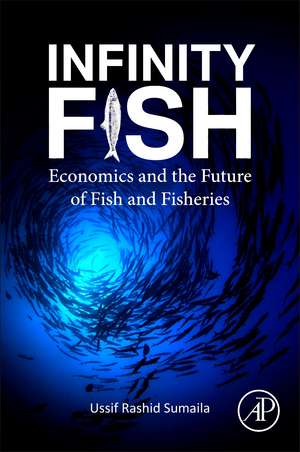Infinity Fish: Economics and the Future of Fish and Fisheries
Autor Ussif Rashid Sumailaen Limba Engleză Paperback – 21 oct 2021
Infinity Fish: Economics and the Future of Fish and Fisheries is a useful reference to a wide range of audiences. It is for those who wish to make systematic efforts to develop their fisheries sector, scientists and researchers, anyone in fisheries management, marine resource management, economists, fish farmers, policy makers, leaders and regulators, operations researchers, as well as faculty and students.
- Includes case studies for each topic and provides detailed summaries to further understand them
- Presents examples and practical applications of cost-benefit concepts
- Provides models of statistical analysis to optimize decision making
Preț: 687.81 lei
Preț vechi: 900.44 lei
-24% Nou
Puncte Express: 1032
Preț estimativ în valută:
131.61€ • 143.41$ • 110.90£
131.61€ • 143.41$ • 110.90£
Carte tipărită la comandă
Livrare economică 16-30 aprilie
Livrare express 19-25 martie pentru 82.50 lei
Preluare comenzi: 021 569.72.76
Specificații
ISBN-13: 9780128238165
ISBN-10: 012823816X
Pagini: 284
Ilustrații: 25 illustrations (20 in full color)
Dimensiuni: 191 x 235 x 22 mm
Greutate: 0.49 kg
Editura: ELSEVIER SCIENCE
ISBN-10: 012823816X
Pagini: 284
Ilustrații: 25 illustrations (20 in full color)
Dimensiuni: 191 x 235 x 22 mm
Greutate: 0.49 kg
Editura: ELSEVIER SCIENCE
Public țintă
Fisheries and ocean policy makers worldwide, professional fisheries management, economists, and resource managementCuprins
1. Introduction
2. Getting values and valuation right
3. Evaluating the benefits from restored ecosystems
4. Intergenerational cost–benefit analysis: A static model
5. Intergenerational discounting: A dynamic model
6. Intergenerational valuation of fisheries resources can justify long-term conservation
7. An ecological-economic model for identifying areas in the ocean with the most vulnerable fish stocks
8. Discount factors and the performance of fisheries management systems
9. An economic indicator for monitoring fishing pressure on marine ecosystems
2. Getting values and valuation right
3. Evaluating the benefits from restored ecosystems
4. Intergenerational cost–benefit analysis: A static model
5. Intergenerational discounting: A dynamic model
6. Intergenerational valuation of fisheries resources can justify long-term conservation
7. An ecological-economic model for identifying areas in the ocean with the most vulnerable fish stocks
8. Discount factors and the performance of fisheries management systems
9. An economic indicator for monitoring fishing pressure on marine ecosystems
